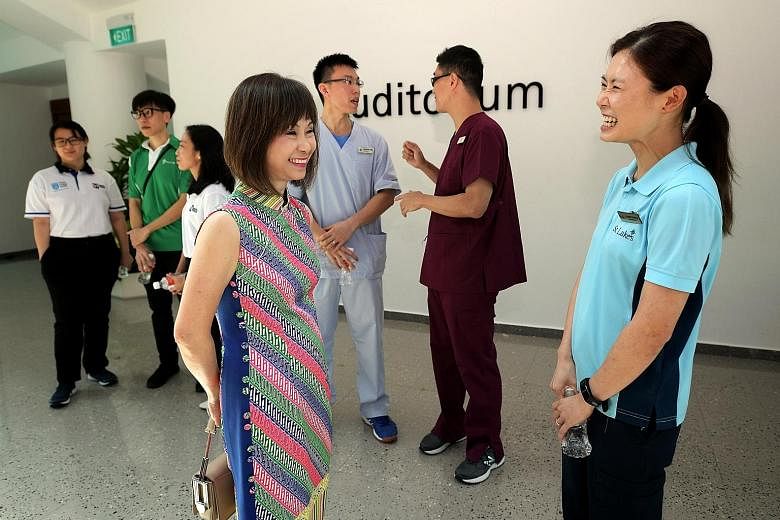Those wanting to make a mid-career switch to physiotherapy can now enrol in an accelerated degree programme launched yesterday.
The Professional Conversion Programme for Physiotherapists (Accelerated) offered by the Singapore Institute of Technology (SIT) is aimed at mid-career locals who already have a science-related degree, including exercise and sports sciences and life sciences.
The accelerated programme, which starts in September, can be completed in under three years.
SIT already offers a four-year professional conversion programme for physiotherapists that is open to diploma and A-level holders, as well as those who are making mid-career switches.
These career conversion programmes are offered by Workforce Singapore and targeted at professionals, managers, executives and technicians.
Senior Minister of State for Health Amy Khor, who attended the launch at SIT, said: "Healthcare is a growing sector due to the ageing population and growing incidence of chronic disease. We need more healthcare professionals to meet the needs of Singaporeans."
-
1,500
Number of mid-career Singaporeans
and permanent residents who have
signed up for the healthcare
professional conversion programmes
since they were started in 2003. -
1,200
Number who have studied to
become nurses. -
300
Estimated number who have opted
for training to become a
physiotherapist, occupational
therapist or diagnostic radiographer.
She added: "Allied healthcare is one of the key sectors, particularly because we are transiting care with more emphasis from the hospital to the community."
Since the healthcare professional conversion programmes were started in 2003, nearly 1,500 mid-career Singaporeans and permanent residents have signed up for them.
Of these, 1,200 studied to become nurses, while close to 300 opted for training to become a physiotherapist, occupational therapist or diagnostic radiographer.
These healthcare professional conversion programmes are jointly offered by Workforce Singapore and the Ministry of Health (MOH).
Dr Khor said that interest has been growing, with 150 mid-career locals joining last year, which is more than double the average number of participants for the last three years.
She added that MOH will continue to review demand and look at introducing accelerated programmes for other healthcare professions.
Those enrolling in the accelerated programme for physiotherapy will enter as Year 2 students in the four-year course. Fees are fully sponsored, and trainees will also receive monthly training allowances ranging from $2,100 to $2,450, which are pegged to their prior years of work experience.
They will also receive a one-time bonus of $2,000 upon graduating and have to serve a four-year bond with their sponsoring company.
SIT said that this year's intake sees 200 students in total joining the two physiotherapy programmes it offers.
Of the current 360 students who are enrolled in the four-year programme, about 20 per cent are those making mid-career switches.
Applications for the accelerated programme for physiotherapy opened on Feb 1 and will close on March 19.
Ms Angela Huang, 33, is one of those who have made a successful transition to physiotherapy.
The former medical technologist wanted to make a bigger difference in patients' lives and enrolled in Nanyang Polytechnic's three-year diploma in physiotherapy in 2013.
"Being a physiotherapist is quite physical because I have to be on my feet the whole day, but I feel very happy when my patients' physical function and mood improve," said Ms Huang, who has been working at St Luke's Hospital since 2016.


